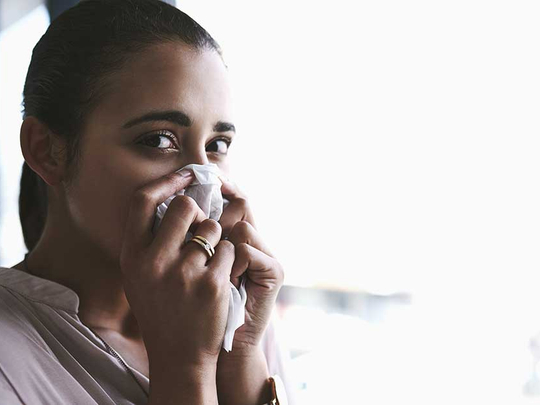
With the onset of summer, doctors are advising those with dust allergies to take adequate precautions to prevent developing allergic rhinitis.
Allergy is an altered body reaction to a foreign substance (allergen) after prior exposure to that substance. According to recent studies, about one in five people in the UAE suffer from allergic rhinitis.
Soaring temperatures and dusty conditions are a breeding ground for dust mites and moulds that thrive in hot and humid environments.
A dusty environment leads to an increase in inhaled sand particles, which can give rise to severe allergies.
“The summer months can cause dust and pollen allergies,” says Dr Hussain Ali Hattawi, Consultant and Head of Allergy and Immunology at Dubai Hospital. “In case of a dust allergy, it is important to decrease the exposure to environmental allergens. In addition to staying inside as much as possible during sandstorms, people who suffer from allergies can benefit from reducing the humidity in their homes and keeping their homes relatively dust-free. Using air purifiers with high-efficiency filters is helpful. Air conditioners should be serviced regularly. Avoid carpets as they collect dust mites and vacuum-clean the house properly to avoid dust.”
The Allergy and Immunology Department treated about 1,236 patients last year, of which 612 were treated by the immunology clinic and 624 by the allergy clinic.
Common allergies
The top three types of allergies, as per the data collected by these clinics, is allergic rhinitis, urticarial (mosquito bite-like symptoms) and food allergies. Dr Hattawi says the reason for a high prevalence of allergies including allergic rhinitis is genetic predisposition and environmental factors.
Environmental factors include indoor and outdoor factors. Dust mites, pets or in some cases cockroaches are indoor allergens, while grass and tree pollens are outdoor allergens. Other outdoor irritants such as pollution and construction do not directly cause allergies but aggravate the symptoms in people who already have them.
“Allergies should be treated on time to prevent the development of more severe conditions such as asthma as they can build up over time,” says Dr Hattawi. “The most common problem is that people are unaware they have allergies and continue to take other medications to treat the symptoms of allergies but do not actually address the real problem. This often leads to deterioration of the condition.
“This is a common scenario in patients with allergic rhinitis because the symptoms include a runny or blocked nose, frequent sneezing and when it includes allergic conjunctivitis it can cause redness, itching and watery eyes.
“Yet, often patients assume this is due to a flu and common cold and continue taking over-the-counter medications. The rule of thumb should be that if the cold continues for more than six weeks and is a frequent occurrence, the patient should visit an allergist.
“Parents need to be very alert, particularly if they find exposure to a particular allergen has caused a reaction.
“An allergic reaction should not be taken lightly because allergies can have mild to extreme reactions.”
Dr Hattawi adds that symptoms could include difficulty breathing, persistent colds, redness and rashes, mosquito bite-like symptoms, pain and bloating in the stomach, diarrhoea and vomiting.
Simple tests
“Nowadays, simple tests can help detect the cause of the allergy,” he says. “Since children do not like blood tests, a simple skin prick test can help identify allergens. In adults, a blood test can identify the source of the allergen and if that does not work, a skin test is the next option. Learning what triggers allergies and understanding how to treat them are the first steps towards controlling allergy.”
Treatment options
Dr Hattawi explains that treatment options include identifying and avoiding or minimising exposure to allergens and irritants through environmental control. Since that is not always possible, patients are also given appropriate medication to minimise symptoms and control the inflammation associated with the allergic reaction.
In some cases, allergen immunotherapy is an option. This treatment actually includes exposing the patient to minute doses of the offending substance, placed under the tongue or in the form of injections, in increasing doses. Over a period of a few years, the patient’s body learns to accept the allergen and there will no longer be any reactions to that allergen.
Food allergens
Dr Hattawi says that in cases of food allergies, especially in children, it is important to educate the child and his caregivers, including the nurses at school, about the situation.
Top food allergies in adults are nuts, shellfish and grains while those in children include milk, eggs, grains, nuts and some fruits.
“People will feel or suspect an allergy to the food item because of the reaction they experience when they consume it,” says Dr Hattawi. “This should never be ignored and they should seek an allergist’s assistance.
“People with severe food allergies should carry with them an epinephrine autoinjector device at all times.
Some allergies can cause life-threatening anaphylaxis and patients must have access to this device within five minutes of consuming the food and they should ideally visit the emergency department within 15 minutes of such an episode.
“Children with food allergies must be taught how to use an epinephrine autoinjector device and if the child is too young the device should be kept with the caregivers and with the school nurse. School staff including all teachers in that year group should be made aware of the child’s allergies.”
Dr Hattawi adds that management of allergies — especially in children — includes education and teamwork so that all those who come into daily contact with the child are aware of the situation.
DHA’s allergy clinic at Dubai Hospital is open every Tuesday from 3pm-9pm.
The facility is a sister clinic to the hospital’s immunology clinic.











